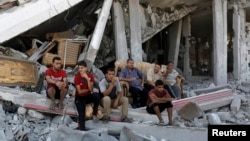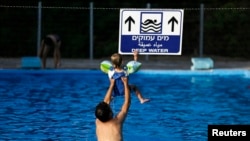U.S. President Barack Obama says the Palestinian territory of Gaza cannot remain permanently closed off from the world.
Obama told reporters in Washington Wednesday that Gaza cannot sustain itself and is not capable of providing jobs and economic growth. He said he has no sympathy for its Hamas rulers, but that there has to be a shift in opportunities for the people of the enclave.
Hamas is demanding that Israel and Egypt lift their blockades of Gaza as a condition for a long-term cease-fire with Israel. Those blockades are meant to keep weapons and terrorists from getting in and out of the region. But they have strangled the Gazan economy and stopped people from traveling.
The president said the United States supports the truce talks taking place in Cairo with Israeli and Palestinian delegations.
Israel says it wants to extend the 72-hour truce with Hamas militants in Gaza.
The truce is set to expire Friday morning local time. Israel did not say how long it is willing to extend it, but a Hamas official in Cairo said there is no agreement yet.
Egyptian officials are holding separate talks with Israeli and Palestinian delegations in Cairo on that long-term cease-fire proposal. They also are talking about the issues that led to a month of Israeli airstrikes in response to Hamas rocket fire from Gaza.
Israeli Prime Minister Benjamin Netanyahu says the Israeli action was "justified." He called every civilian casualty a tragedy, but one of Hamas' own making, for using civilians as human shields.
Israel's air and ground campaigns into Gaza killed more than 1,800 Palestinians, mostly civilians including hundreds of children. Sixty-four Israeli soldiers and three civilians died.
Once-thriving Gaza neighborhoods are now huge piles of rubble, stone and dust.
U.N. Secretary-General Ban Ki-moon repeated his anger Wednesday about Israeli shelling of U.N. schools and facilities that were supposed to shelter civilians. Israel accused Hamas of storing weapons and launching attacks from these buildings.
Cease-fire negotiations
Egyptian intelligence officials continue to shepherd the "indirect" talks between the Israeli and Palestinian delegations, shunning publicity in the media.
It remains unclear, however, if Egypt will be able to broker any agreement for a long-term cease-fire, given the seemingly irreconcilable nature of demands by both sides.
Top Hamas official Ezzet Rashq has rejected Israel's call for “demilitarization.” It was unlikely Israel would agree to Hamas demands for an unfettered lifting of its blockade.
Hamas insists that Israel allow it to open an airport and to access an international norm of 12 miles of territorial waters.
Joining the talks in Cairo are Robert Serry, the United Nations special representative for the Middle East peace process, and Tony Blair, Quartet representative. (The Quartet consists of the United Nations, the U.S., European Union and Russia. Its mandate is to help mediate Middle East peace negotiations and to support Palestinian development as it prepares for statehood.)
Blair and Serry are expected to meet with Israel and Hamas separately.
U.S. envoy Frank Lowenstein was expected in Cairo Wednesday to help with negotiations.
'They are shell-shocked'
Thousands of Palestinians who fled their homes in Gaza to seek refuge during Israeli airstrikes last month are now returning home, only to find no homes to return to.
"I could not recognize my house," said one Palestinian man standing on a pile of rubble. "I cannot believe my eyes. I am shocked."
The United Nations said at least 60,000 Palestinians have lost their homes in Gaza.
Infrastructure such as electricity, running water and sewage treatment have been severely damaged and will take years to rebuild, at an estimated cost of at least $6 billion.
Jacques de Maio, who heads the International Red Cross' head of the delegation in Israel and the territories, spoke of the conditions in Gaza.
In an interview with Israel Radio, de Maio warned of a dire humanitarian crisis.
"One has to see that the people are traumatized. They are shell-shocked," de Maio said.
"What jumps to the eyes immediately is the infrastructural destruction. We have been in areas which have been simply flattened down, and it's a breakdown of hope," he said.
On the Israeli side of the border, residents may have homes to return to, but many are afraid to go back.
The biggest fear is that heavily armed Palestinian gunmen could tunnel into their communities and carry out a massacre or take hostages.
"The thought that there are people under my house or close to my house digging, and maybe they will just come out one day and kill me or kill my family, it's scary," said Noah Cuperstein, a 16-year-old Israeli from a farming community on the Gaza frontier.
The Israeli army said it has destroyed all the Hamas tunnels it knows about, about 30 in all. But it is the tunnels the army may not know about that have people worried and scared.
Heavy toll on children
Speaking from Jerusalem, a spokeswoman for the UN Children's Fund, Catherine Weibel, told VOA the conflict's effect on civilians in Gaza had reached crisis proportions.
"Right now we are facing a humanitarian crisis in Gaza, and there are huge needs. As of today, UNICEF has counted more than 400 children who have been killed, 419, and sadly we think that this number will rise, we have also nearly 3,000 who have been injured sometimes very badly in this conflict."
VOA's Margaret Besheer contributed to this report from the United Nations.





